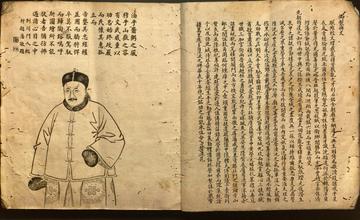
Drawing of Cen Yuying from a book called Cen Xiangqin gong xun de jie fu tu : si shi tu yi juan, Library of Congress
It is now well-known that the Manchu rulers of the Qing dynasty (1644-1912) sharply altered their predecessors’ understandings of what it meant to rule “all under heaven”; meanwhile Qing conquests doubled the empire’s land area. Initially, much of the Chinese elite saw much of this new territory as mere buffer zones, to be occupied only insofar as this kept hostile nomads from doing so. A central reason for this skepticism was that many of the newly-acquired lands were ill-suited to agriculture, the “fundamental occupation” of “civilized” life.
By roughly 1850, however, many Han literati came to see many frontier regions as properly “Chinese” territory. More gradually, they also came to see certain previously despised groups of people – including such common frontier figures as miners and loggers — as potential “good subjects.” These transformations – influenced both by changes in official discourse and changes in who was actually migrating – set the stage for further changes later: ones which re-imagined China’s far west as resource-rich territories which had to be held and “developed,” even when the Chinese state was hard-pressed on other fronts. A still further shift occurred in the 20th century, in which the people involved in exploiting these remote territories, not only ceased to be denigrated as dangerous “drifters,” but came to be seen as part of the vanguard of the nation.
About the Speaker
Kenneth Pomeranz is University Professor of Modern Chinese History at the University of Chicago, where he is also a Faculty Member of the Center for East Asian Studies and the Stevanovich Institute on the Formation of Knowledge. He has published extensively on the history of China, placing it squarely within the foundation of modern world history: he is the author of two award-winning monographs, editor or co-editor of at least eight books, author of more than forty articles and book chapters as well as countless review articles, lectures, and online discussion pieces. Among his many distinctions, Professor Pomeranz has recently been awarded the Toynbee Prize for Global History.
For the 2023 University of Oxford Astor Lecture in Global History, he will be speaking on his current research project, ‘Why Is China So Big? Rethinking the Realm and its Subjects under the Qing.’
This lecture will be followed by a drinks reception.